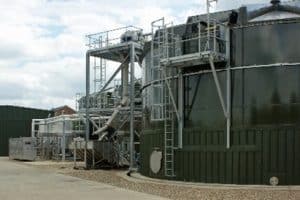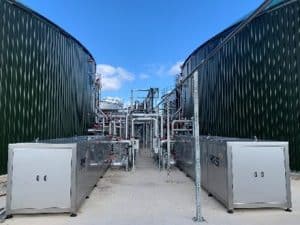
Member Press Release (Opinion piece) – Can the UK meet its AD potential?

By Matt Hale, International Sales & Marketing Director, HRS Heat Exchangers
The UK has almost 730 operational anaerobic digestion (AD) plants, with a capacity of more than 2,800 MW of biogas for use as renewable heat, electricity or biomethane (green gas) (1). These figures are impressive but many in the UK biogas sector – HRS included – believe that the current deployment of AD in the UK is just a fraction of the country’s total potential.
The potential for AD

A report commissioned by Cadent Gas Ltd in 20172 concluded that waste feedstocks, (local authority collected waste, commercial & industrial waste, construction & demolition waste, and sewage sludge) had the potential to generate between 47 and 56 TWh of renewable gas (split between 83% Bio-Synthetic Natural Gas (BioSNG) from gasification and 17% biomethane from anaerobic digestion). The same report also suggested that between 21 and 127 TWh of renewable gas could be generated from non-waste feedstocks (including energy crops, agricultural and forestry residues, manures and other co-products).
If we take the most conservative of these forecasts, using only waste feedstock, then we can see that the total potential for AD in the UK is around 8 TWh of biogas, or 8,000,000 MWh. Based on these figures, current UK capacity is a tiny fraction of the theoretical maximum. We can argue about specific numbers, but there is no doubt that there is still a massive opportunity to boost current AD capacity across the United Kingdom.
The Cadent report is not the only source to underline the huge potential of biogas in the UK’s energy mix. The Anaerobic Digestion and Bioresources Association (ADBA) projects that the UK could generate 5.7 billion m3/year of biomethane by 2030, enough to heat 4.5 million homes. ‘Assuming a conservative improvement in plant efficiency of 25%, these figures could rise to 7.1 billion m3/year, enough to heat 5.5 million homes. With emerging power-to-gas technology, the biomethane potential could increase to 8.0 billion m3/year by adding hydrogen to the AD process to boost the methane content of the biogas generated, equivalent to heating 6.4 million homes. This would deliver a carbon saving of 27.2 million metric tons of CO2 equivalent/year — 6% of the UK’s current annual emissions —specifically within the hardest to decarbonize sectors.’(2)
The benefits of biogas
Anaerobic digestion is unique among the main forms of renewable green energy in that it provides other benefits in addition to the provision of low-carbon energy. It offers a sustainable method for the treatment of organic wastes, and in so doing prevents fugitive carbon emissions from the uncontrolled decomposition of such wastes. AD also produces a nutrient-rich, renewable biofertiliser known as digestate, which can help offset agricultural emissions and improve soil health and organic matter.

Not only this, but biogas and biomethane are uniquely flexible forms of renewable energy. Biogas can be used for heating, or for the generation of electricity via combined heat and power (CHP) units. When upgraded to biomethane, it can be used as a direct replacement for natural gas in the UK gas grid, or as a green transport fuel which is particularly suitable for heavy goods vehicles. These benefits mean that ‘renewable gas can make a significant contribution to meeting 2050 climate change targets, in particular when supporting decarbonisation of the heat and transport sectors, which are currently lagging behind the electricity sector.’(3)
The importance of policy
The importance of supportive policies to drive developments in renewable energy, waste treatment and decarbonisation is well known. In additon, overall energy policy and development needs long term stability and profitability in order to maintain sufficient investment in future infrastructure – and biogas plants are no different.
Over the last 20 years, the AD sector has seen a number of policies designed to promote its development in the UK, including the Renewables Obligation (RO), Renewable Heat Incentive (RHI), Renewable Transport Fuels Obligation (RTFO), Feed in Tariffs (FITs) and Contracts for Difference (CfD). Some of these have been more sucecssful than others, due to numerous factors including the rate of support offered, the period of support provided and the certainty of acceptance into the scheme. Other policies concerning carbon emmissions and waste minimisation have also been important, for example the Climate Change Levy, Emissions Trading Scheme (ETS) and gate fees for waste feedstocks.
Following the closure of the RHI, the current support for the AD sector comes in the form of the Green Gas Support Scheme, the UK’s first support scheme created specifically for the AD sector.1 The GGSS has an annual budget of £150 million.
ADBA analysis of the policy ‘indicates that the GGSS has the potential to support the development of 45-50 new biomethane plants, producing around 2.7 TWh per year. However, much like the RHI, support focuses solely on energy generation, and with the scheme’s 50% waste requirement, the development of projects will depend on the ability to source high biogas yielding waste feedstocks – primarily food waste.’(1)
The need for leadership
While the GGSS is welcome it is currently only scheduled to run until 2025, and food waste collection will not be mandated in England until that date. Furthermore, recent political noises about the perceived impact of the costs of various ‘green’ policies and initatives have created significant uncertainty in the market and among investors.
In short, there appears to be a considerable lack of ambition from government. The Powering Up Britain report from the relatively new Department for Energy Security and Net Zero (DESNZ) mentioned biomethane in the context of making UK energy systems more independent, secure and resilient, but failed to engage the sector or fully apreciate the potential scale of this mature technology.
As ADBA Chairman Chris Huhne commented on the report’s publication, “At a time when other European governments are boosting biogas as a key part of their policy, this energy security strategy shows little grasp of the potential of the sector or what is needed to unlock it. At least biogas and biomethane are mentioned – an advance of last April’s energy security strategy – but words are cheap. We need action on planning, regulation, bankability, grid connections and more to give Britain home-grown green gas.”
In contrast, the Climate Change Committee’s (CCC) Sixth Carbon Budget recognises the various roles of AD in meeting the UK’s emmissions targets, in particular its role in tackling emmissions associated with food waste, wastewater treatment and agriculture.
What is required?
We began this article by asking whether the UK can meet its AD potential. The answer is yes, provided that the industry is given the right policy support. In particular, there needs to be a ban on all biodegradable wastes being sent to landfill – something which the CCC has proposed from 2025 – and this material must be diverted to AD facilities.
Furthermore, all wastewater treatment plants should include AD systems, which the CCC believes could reduce such emissions by 21% by 2030. AD also has a key role to play in the treatment of agricultural and food waste, both on farms and in processing factories, and this investment needs to be supported with suitable policies. The use of low emission technology for the application of digestate also needs to be supported, for example through the Sustainable Farming Incentive (SFI).
In addition, there needs to be more support during the planning and pre-development stages, with local authorities recognising that AD plants can help them meet carbon reduction targets in their region. The devolved nature of many of the policies which drive AD investment across the UK has unfortunately resulted in different support schemes and planning policies across the country. Overall, simplification of the many different policies and legislative requirements would be one of the biggest factors in facilitating new AD development.

The importance of efficiency
Finally, however much policy support is given to the biogas sector, it is imperative that anaerobic digestion plants maximise efficiency at every stage of the process, for both economic and environmental reasons. ADBA clearly believes that there is room to improve the efficiency of AD plants1, and doing so will require a multi-disciplinary approach including the use of heat regeneration through heat exchangers, as well as the use of bespoke systems such as the HRS BDS (Biogas Dehumidification System), DCS (Digestate Concentration System) and DPS (Digestate Pasteurisation System).
(1) ADBA Anaerobic Digestion Policy Report – April 2023
(2) ADBA Biomethane: The Pathway to 2030
(3) Review of Bioenergy Potential: Summary Report For Cadent Gas Ltd
– ENDS –
About HRS Heat Exchangers
Located in the UK, HRS Heat Exchangers is part of the EIL Group (Exchanger Industries Limited) which operates at the forefront of thermal technology. HRS offers innovative heat transfer solutions worldwide across a diverse range of industries. With more than 40 years’ experience in the anaerobic digestion and biogas sector, specialising in the design and manufacture of an extensive range of turnkey systems and components, incorporating our corrugated tubular and scraped surface heat exchanger technology, HRS products are compliant with global design and industry standards. HRS has a network of offices throughout the world: Australia, Canada, New Zealand, UK, Spain, USA, Malaysia and India; with manufacturing plants in the UK, India, Spain and Canada.
For UK media enquiries about HRS Heat Exchangers please contact:
Yenni Maelianawati, Senior Marketing Manager, 3 Abloy House, Hatters Lane, Watford, Hertfordshire, WD18 8AJ
Tel: +44 (0) 1923 232 335
Direct Email: yenni@uk.hrs-he.com
Email for publication: info@uk.hrs-he.com
www.hrs-heatexchangers.com

